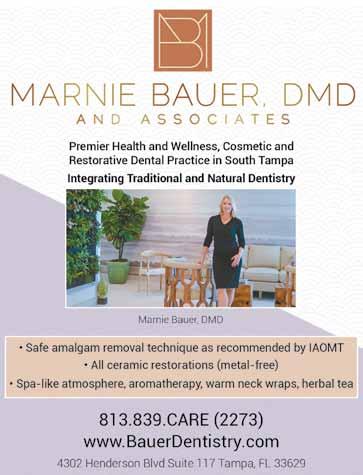
3 minute read
BREATHE EASY
Natural Remedies for Allergy Woes
by Ronica O’Hara
Advertisement
As the one in five Americans suffering from allergic rhinitis can miserably testify, the fragrant breezes of spring aren’t much fun when they bring on sneezing, coughing, watery eyes and a runny nose. The fifth-most common chronic disease in the country, allergic rhinitis—also known as hay fever—is aggravated in spring by rising pollen levels, but can occur year-round from exposure to mold, household dust mites, pet dander and vehicular air pollution.
laura negrato/AdobeStock.com
Common remedies like over-the-counter antihistamines and decongestants bring their own share of afflictions, including drowsiness, dry mouth, blurred vision and dizziness. “By undertaking natural therapy for allergies, however, one can avoid and mitigate the unpleasant symptoms of allergies with no need for medication,” says Carrie Lam, M.D., an integrative and functional medicine doctor in Tustin, California. “Instead of loading up on drugs, you can take care of yourself in a more natural way and avoid nasty side effects.” Here are some non-pharmaceutical approaches.
Probiotics: In a 173-person, double-blind study, a probiotic blend of Lactobacillus gasseri KS-13, Bifidobacterum bifidum G9-1 and Bifidobacterium longum MM-2 lowered hay fever symptoms and improved participants’ quality of life during allergy season, report University of Florida researchers in the American Journal of Clinical Nutrition. (Read labels to locate these strains in yogurts, kefirs and supplements.)
Sublingual Immunotherapy: To desensitize the body, small amounts of specific allergens in the form of tablets or liquid drops are placed under the tongue, making it a gentler and safer process than allergy shots. Numerous studies have shown it to be safe and efficient in the treatment of respiratory tract allergies, reports JoAnn Yanez, ND, executive director of the Association of Accredited Naturopathic Medical Colleges (AANMC). After getting a diagnosis and a first dose from a health practitioner, the tablets or drops can be taken at home.
Quercetin: Found naturally in apples, berries, red grapes, red onions, red wine and black tea, this antioxidant inhibits the release of histamine and hampers the IgE antibodies formed during allergic reactions. As a 400-milligram (mg) supplement, it takes about a month to kick in.
Stinging Nettle (Urtica dioica): When freeze-dried as an extract or used as a tea, this prickly roadside weed is a nontoxic
natural antihistamine. In one study, 58 percent of participants found that 300 mg per day relieved their symptoms.
Omega-3s: Anti-inflammatory fatty acids found in such foods as tuna, salmon, walnuts and flaxseed oil can help reduce symptoms, research suggests. In a Japanese study, eating fish lowered respiratory symptoms for women, while fast food and sugary drinks worsened respiratory stress.
Nasal Rinse: Using a neti pot with saline solution to rinse allergens out of nasal passages provides quick relief for stuffy, runny, irritated noses. In one study, people using them reported a 64 percent improvement in chronic sinus symptoms and a better quality of life. An ancient Ayurveda technique popularized by Oprah Winfrey and Dr. Oz, the pots cost about $20 in pharmacies. Nasal sprays, although easier to use initially, aren’t as effective, studies show.
Unpasteurized Honey: “Local honey contains tiny amounts of pollen from nearby flowers, which can make you less sensitive when you’re exposed to them outdoors,” says chiropractor and nutritionist Josh Axe, Nashville-based author of Ancient Remedies. A Malaysian study of 40 hay fever sufferers found that high doses of local honey, taken along with an antihistamine, reduced sneezing and nasal decongestion more effectively than the antihistamine alone.
Acupuncture: Based on established research, the American Academy of Otolaryngology-Head and Neck Surgery Foundation recommends acupuncture for hay fever patients that want to avoid pharmaceuticals.
Homeopathy: To stimulate the body’s natural healing process, homeopathy uses highly diluted doses of herbs and other substances. Although it’s best to work with a homeopath, two helpful remedies commonly found in health food stores are Allium cepa 30C, for watery eyes, sneezing and a runny or irritated nose; and Kali bichromicum 30C, for persistent sinus congestion with thick nasal discharge.
Anti-Allergen Cleaning: Simple steps recommended by AANMC to lower airborne allergens include using a highefficiency particulate air (HEPA) filter in the vacuum cleaner; replacing AC filters frequently; changing out of clothes and showering when coming in from the outdoors to rinse off pollen; leaving shoes outside; changing the air filter in the car; and avoiding toxic inhalants with synthetic ingredients like perfumes, body sprays, scented candles, room sprays, air fresheners and dryer sheets.
Ronica O’Hara, a natural health writer, can be reached at OHaraRonica@gmail.com.








